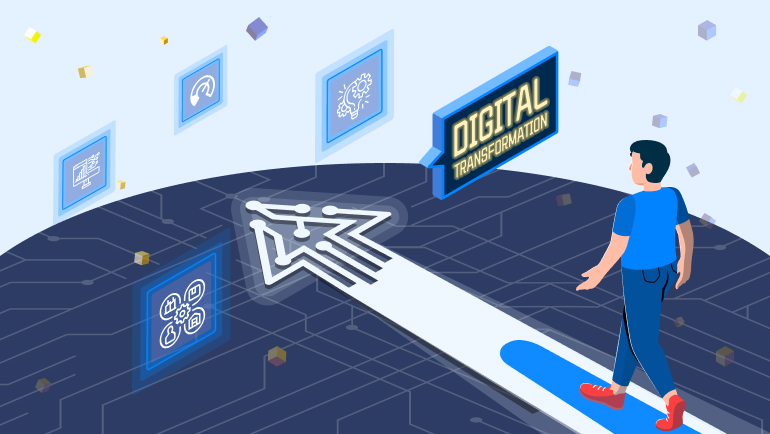

As a CIO, it is essential for you to ensure smooth change management during your digital HR transformation. The HR function is the key to ensuring that every employee supports any new digital initiative and can help the IT function get things done every step of the way.
Next-gen technology, comfortable budgets, flawless strategy, free reign from the management to digitize processes, a solid IT team to help execute the plan...and yet your digital transformation program just isn’t taking off?
Take a deep breath, clear your mind, and you’ll realize what you’ve missed, staring right at your face.
That’s right, your people – the very folks who the digital transformation is being done for. Without a thorough, real-time understanding of people stack, a CIO can only initiate innovations and not see the success of it.
Your organization’s HR function is your key to ensuring that every employee supports any new digital initiative. The HR team has access to every employee and can help the IT function get things done every step of the way.
Here’s a five-step framework you can follow:
Go Bottom-up
Digital HR transformation is on the agenda for most CIOs and leaders today. It signals futuristic planning and initiative by the organization to keep up with the evolving world of work.
But merely shoving tech changes down employees’ throats won’t help. Initiatives might trickle all the way down from the top but might go off track by the time the initiatives reach the employees.
So, be sure to get a clear sense of what the situation is like on the ground. The market is rife with digital tools that have the potential to dramatically improve operations and processes, but what looks great on paper might not be the best one for your team. Gather the real pain points of your employees, where they need help to be more productive, what disrupts in generating business, and prioritize your change management accordingly
⭐ Invest time in speaking with the rank and file of the organization, listen to their requirements, and plan your digital transformation strategy accordingly. What works for another company might not work for you, so tailor your plans based on what you hear from your employees.
Form Your Star Team
As the CIO, you’re in charge of taking the big decisions and driving the initiative, but there’s little you can do without your A-team to turn strat into action.
Work closely with your counterparts in the HR function and other teams to assemble a cross-functional, multi-skilled, diverse team that can ensure that the change happens at every employee’s desk.
Bringing about change in an organization’s tech infrastructure is tough work. Before jumping into implementing change, it is critical to ensure that the team has all the skills required to execute the mega initiative.
⭐ Plan for and invest time and resources to arm your team with all the skills and tools they need before embarking on the change. Buy, borrow, nurture, or do whatever else it takes to ensure your team is skilled and set to make the shift.
Lobby for Change
We humans are naturally resistant to change. We might know fully well that the change is good, but fighting inertia is a major project by itself. And it is something several organizations tend to overlook or underestimate.
As you plan any major change in the company, gauge the pulse of your employees to see how effective a big innovation roll-out would be received by them. Prep up your employees by communicating your change management initiatives or the launch of your innovations much before they are actually launched.
Organize focused-group meetings, roll out surveys, have informal conversations by their desks to understand how they feel about the change. The input will help not just plan the change management strategy better, but take steps to assuage any concerns or fears they might have.
⭐ Nothing’s as effective as a heart-to-heart conversation. During the process of change, be sure to focus on the human, the personal, and work with your employees to ensure they’re as emotionally invested in the change as you are. If done right, half the adoption battle is won if employees are as excited about the change as you are.
Make People Analytics your BFF
As valuable as the human aspect, is data. Even as you’re working on the intangibles, invest in collecting and studying hard data.
Use tools such as AI and advanced analytics to crunch numbers, study data, and bring out actionable insight that can inform your strategy. Technology can help reduce the time and effort taken to study data – both internal data and market data – to make projections, explore possible risks and challenges, examine requirements, etc.
⭐ Your employee data is a rich, powerful source of insight. Be sure to make the most of people analytics and technology to make your decisions more accurate, efficient, and effective.
Stay in Touch With Employees
A common mistake that many companies make is to work deeply with their teams when they initiative a major organization-wide project, and then abruptly drop the conversation.
It isn’t just enough to gain employee input while charting out plans, it is critical to keep them involved throughout the process so you can make any tweaks or iterations in the plan before it is too late to make a change. And in addition to ensuring that the project you’re working on is completed smoothly, seeking employee input consistently will help you take better decisions for other projects you might be planning.
Regular feedback is super essential for forecasting requirements and planning for upcoming projects. As a CIO, you spend a good amount of time with forecasting, and employee feedback is an indispensable element for planning and forecasting accurately.
⭐ Employees are great first-hand sounding boards you have easy access to. Make the best use of them to gather feedback from time to time.
No prizes for guessing what the best way to get this done ... that’s right – a solid CIO-CHRO partnership and a comprehensive HR tech platform that will give you access to every single employee in the organization and provide you with all the tools you need to involve your employees in any innovations and changes you bring to the organization.
Your people pillar will back you and support you through any change you bring in, however dramatic or disruptive they might be. Believe in the power of your people!


Speak Your Mind